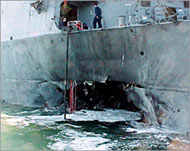Yemen jails six al-Qaida suspects
A Yemeni court has sentenced six Yemeni al-Qaida suspects to two years in jail for forging travel documents in an attempt to join those fighting US forces in Iraq and Afghanistan.

Five other Yemenis arrested in the same case were acquitted. All 11 men were acquitted of another charge of setting up an armed group to carry out attacks in Yemen.
Fighters, many of them from Arab countries, are battling the US military presence in Iraq and Afghanistan.
Yemen is the ancestral home of al-Qaida leader Usama bin Ladin and is said to be a staging ground for al-Qaida fighters.
“Allahu Akbar” (God is greatest), the men shouted after the verdict was read in court.
Planning attacks
They were among a group of 14 al-Qaida suspects detained for alleged links to attacks in Yemen. Three were released due to lack of evidence before the trial began in February.
 |
|
The 2000 attack on the USS Cole |
Lawyers said six of the defendants had been handed over to Yemen by neighbouring Saudi Arabia, the birthplace of bin Ladin and which has been battling insurgents for more than two years.
Yemen has cracked down on fighters since the 11 September 2001 attacks on US cities. It has captured several al-Qaida followers, including those behind the 2000 USS Cole bombing and the 2002 attack on the French supertanker Limburg.
Australian trial
Elsewhere, Australia’s second terrorism trial opened on Monday with a court hearing that a man planned to carry out an attack on government buildings to kill either intelligence or foreign affairs officers.
Zaky Malla, nicknamed Zak, who was born in Australia to Lebanese parents, has pleaded not guilty to three terrorism-related charges.
He is accused of plotting to carry out an attack on the Sydney offices of the Department of Foreign Affairs and Trade (DFAT) or the Australian Security and Intelligence Organisation (ASIO), in late 2003.
The New South Wales Supreme Court heard on Monday that Malla decided to act after the department refused to grant him a passport in 2002.
“As a result of that refusal he developed a hostility to that department and ASIO,” crown prosecutor Desmond Fagan said. Malla had also told an undercover police officer he wanted to kill Commonwealth officers, Fagan said.
The jury was told the prosecution had video and a document that would show Malla had declared “a personal jihad” on the ASIO. Defence counsel will address the court on Tuesday.